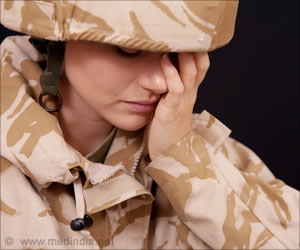
The number of women cared for by veteran affairs facilities has doubled in the past decade, providing a unique opportunity to examine the heart health of women veterans.
The study reveals women veterans face a home front battle against heart disease that's significantly different from men veterans and women who have never served in the military.
Although chest pain was a common reason for women to undergo cardiac catheterization, a medical procedure to diagnose and treat some heart conditions, doctors were less likely to find blockages in women’s arteries that could lead to a heart attack or stroke, says lead study author Melinda B. Davis, M.D., cardiologist at the University of Michigan Frankel Cardiovascular Center and the VA Ann Arbor Healthcare System.
The findings may prompt a closer look at stress-induced heart disease, and coronary microvascular disease -- spasms in the walls of very small arterial blood vessels which can lead to severe and long-lasting angina, or chest pain – as causes of chest pain for women veterans.
Additional findings from the national study of nearly 86,000 veterans, including 3,181 women: --Generally women are older and have more risk factors for heart disease such as hypertension, diabetes and high cholesterol than men, but women veterans were younger and had fewer heart disease risks than men veterans.
Advertisement
-- Women veterans had similar 1-year outcomes after the cardiac catheterization. They were less likely to leave the hospital with heart medications even if doctors found acute disease.
Advertisement
“Investigating the reasons behind these findings and developing effective approaches based on those insights could potentially help address the gender differences in heart disease we see in the general population,” says senior study author Claire Duvernoy, M.D., chief of cardiology at VA Healthcare Ann Arbor and cardiologist at the U-M Cardiovascular Center.
The VA Ann Arbor and University of Michigan, along with colleagues at the VA Eastern Colorado Health Care System and the University of Colorado School of Medicine, published the study in Circulation: Cardiovascular Quality and Outcomes, an AHA journal.
A portion of the March issue is dedicated to research in women.
Women are generally underrepresented in heart disease research, according to the AHA. Because of this gap, physicians lack important information about how women might respond differently to heart disease, have different symptoms and need different diagnostic approaches and treatments.
“Dedicating a women’s themed section in this research journal offers the latest in quality studies on women and reminds us about the importance of this area of investigation,” Harlan Krumholz, M.D., S.M., editor of the journal, director of the Center of Outcomes Research and Evaluation at Yale-New Haven Hospital and a professor in Yale’s schools of medicine and public health in New Haven, Conn., said in an AHA statement.
“In the future, if we really want to answer all the questions we have about gender differences, then we need studies that are large enough, focused enough and with the intent from the start to illuminate the issues around sex differences,” he said.
Source-Medindia










